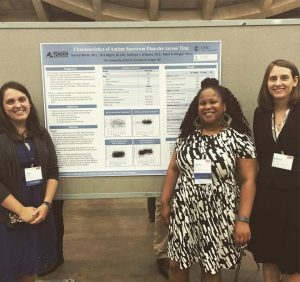Service

PEARLS Faculty, Investigators, and Staff are committed to bridging the gap that sometimes occurs between the autism research that is conducted and the practitioners, children, and families who can utilize the knowledge generated. Therefore, PEARLS includes several initiatives aimed at providing the most up-to-date evidence-based information to community groups and individuals. The Autism Alliance is a committee of individuals from agencies and programs across the state focused on identifying and enhancing screening efforts in North Carolina. Currently PEARLS faculty and investigators are conducting treatment studies (two with infants and toddlers at-risk for autism, the other with preschoolers with autism) aimed at comparing treatment effects across varied conditions. PEARLS Faculty, Investigators, and Staff also present numerous scientific papers and posters, conduct national, state, and local workshops and in-service activities, and sponsor visiting scholars. Finally, the PEARLS Faculty and Staff have been providing continuing education opportunities for area physician groups focused on the early identification of risk of autism in infants and toddlers. If your physician group seeks to have PEARLS provide an inservice opportunity for your practice, contact Dr. Elizabeth Crais.
PEARLS team members, coordinated by Michaela DuBay, Linda Watson, and Jessica Kinard, have created a Spanish-language video presentation series aiming to provide informational support for family members and professionals who care for and serve individuals with autism in Bolivia. As a part of the Autism Project, supported by the North Carolina chapter of Partner’s of the Americas, several PEARLS team members have visited with colleagues in Bolivia since 2012. Through consultation and collaboration with newly formed autism committees in four cities in Bolivia, training for families and professionals was identified as an immediate need. Because travel expenses prohibit frequent visits for ongoing training with autism experts, local committees suggested the use of technology to help meet these training needs. This video presentation project allows for ongoing professional support and training while reducing travel costs. The project includes twenty-five pre-recorded Spanish-language presentations, split into three series, made available to family members and professionals at no cost.